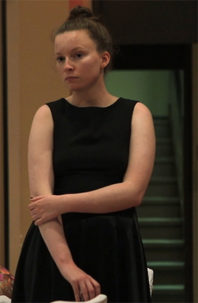
Many people have family heirlooms; pocket watches, letters, journals, passed down from several generations. For many people these objects are treasured parts of their family history. They carry a significance of history and imagined stories. They make us feel closer to our ancestors and our heritage.
In Sofia Bohdanowicz and Deragh Campbell’s new feature MS Slavic 7 Audrey (Deragh Campbell) is a young woman who is the rightful heir to a collection of her grandmother’s letters that are currently being housed in a Harvard library archive. These letters are more than just simple correspondences. They are the lamentations of a poet to a former lover living back in Poland. They are painfully romantic, and deeply personal.
For Audrey they are more than just simple letters as well. They take on a greater significance as one of the few things that offer her some quiet solitude in her life. Early on in MS Slavic 7, we’re afforded several beautiful extreme close-ups of the written pages, while the sound design emphasizes each fluttering twist of movement. The implication here is that this is more than just a letter, it’s a life on page.
At least it feels that way. There’s a weird sense of intrusion eminent throughout this film. This is clearly a very autobiographical work, with Campbell ostensibly playing Bohdanowicz’s alter ego once again, following her turn as Audrey in the feature Never Eat Alone. Audrey is rarely photographed in the frame with another person. It’s a sparse cast, consisting of the lead and maybe two or three other characters at the most; four if you want to count the correspondences themselves. There is no one coming to help Audrey understand her complicated relationship to her past. She is isolated in attempts to reconcile with her heritage.

Even the crew itself is bare bones. Bohdanowicz has a hand in every department, save the sound design. Campbell pulls quintuple duty as co-director, star, co-producer, co-writer, and co-editor. MS Slavic 7 is a fictional film, but it intrinsically feels too intimate to be so. It is better to describe this as a docufiction, where you’re unable to parse where the fiction begins and where it ends. Good luck trying to find the seams.
As Bohdanowicz’s alter-ego, Campbell provides another stunning performance. As an actress, it’s clear that she’s settled into a bit of a niche as the human embodiment of perpetual millennial searching for a place in the world. You can sense a struggle to communicate in her speech patterns, which seem to always be on the brink of saying providing something profound, before tailing off into uncertainty.
It is the essayistic tendencies, however, that offer MS Slavic 7 a slight deviation from falling into becoming a generic piece of mumblecore fiction. Large swathes of the writing itself appears subtitled on screen. In this sense you’re reading along with Audrey. But you’re also only reading small snippets, an effect that again, produces a sensation of imposition like we’re intruding into a place we should not be. You can feel the love Audrey has for these letters throughout the film. The sheer beauty of the written word is undeniable.
It bears mentioning that this is a slow film. It’s an hour long, but feels longer. Ackerman is the clear reference point here; MS Slavic 7 as News From Home without the voice over narration and the emphasis on urban New York. It’s a good rule of thumb, as Bohdanowicz and Campbell’s film aims to be every bit as felt as its spiritual predecessors. Basic action is almost non-existent, and changing plot points are minimal. Those who are salivating at such a description already know who they are. Those recoiling are just as aware.
Ultimately though, MS Slavic 7 is a deeply human picture investigating a deeply human facet of life. There is no denying that it hits hard when it has to. It’s a highly recommended new feature from two of the most talented voices presently working in Canadian independent cinema.
- Release Date: 10/10/2019

